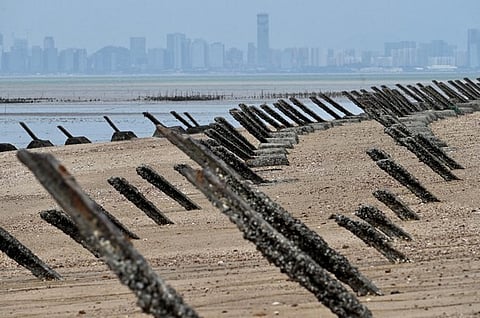
- Home
- न्यूजग्राम
- NewsGram USA
- India
- World
- Politics
- Entertainment
- Culture
- Lifestyle
- Economy
- Sports
- Sp. Coverage
- Misc.
- NewsGram Exclusive
- Jobs / Internships

Taiwan on Tuesday rejected China's claim that the Taiwan Strait, the body of water between the democratic island and China, were its own territorial waters. Foreign ministry spokeswoman Joanne Ou said the Taiwan Strait is defined in international law as international waters.
"Our government has always respected any activities conducted by foreign vessels in the Taiwan Strait that are allowed by international law," Ou told reporters in Taipei.
"We understand and support the freedom of navigation operations conducted by the U.S. as these operations promote peace and stability in the region," she said. She said recent comments by Chinese foreign ministry spokesman Wang Wenbin laying claim to the Taiwan Strait were "a distortion of international law."
She said Wang's comments revealed [China's] ambition to annex Taiwan. While Taiwan has never been governed by the Chinese Communist Party (CCP) nor formed part of the People's Republic of China, and its 23 million people have no wish to give up their sovereignty or democratic way of life, Beijing insists the island is part of its territory.
"Taiwan is an inalienable part of China's territory," Wang told a news conference on June 13. "Taiwan has sovereignty, sovereign rights and jurisdiction over the Taiwan Strait."
"It is a false claim when certain countries call the Taiwan Strait 'international waters' in order to find a pretext for manipulating issues related to Taiwan and threatening China’s sovereignty and security," he said.
China vs rule-based international order
In Taipei, Ou said Taiwan will continue to work with like-minded countries to jointly uphold the rule-based international order and promote peace and stability in the Indo-Pacific region. According to the United Nations Convention on the Law of the Sea (UNCLOS), countries can claim an area 12 nautical miles (22 kilometers) from the coast as their territorial seas, where they have full sovereignty. They can also claim exclusive economic rights over waters up to 200 nautical miles from their coast, but other countries still have the right to sail through or fly over the waters. Most of the Taiwan Strait is less than 200 nautical miles wide, meaning that Chinese and Taiwanese economic claims mostly overlap. Huang Chieh-chung, associate professor of international affairs and strategy at Taiwan's Tamkang University, said the timing of Wang's claim was interesting.
"Is it appropriate to come out and say something like this now? The intentions behind [Wang's comments] may need further analysis," he said. He said it was unclear whether the international community would support China's claim.
"The Taiwan Strait is an important international waterway, so how can China claim it all as its own?" Huang said. "Whether or not China can win international support for this view is up to them. But we in Taiwan won't accept it."
Legitimacy rejected
Ye Yaoyuan, director of the Department of International Studies and Contemporary Linguistics at the University of St. Thomas in the United States, said Beijing's intention could be linked to legal moves aimed at paving the way for a military invasion of Taiwan.
"One thing China has been doing is showing [its actions regarding Taiwan] from a legal point of view," Ye told RFA. "If there is war in the Taiwan Strait, can they prevent other countries from intervening in such a war using international law, or intimidate them?"
"China has been making comments, particularly using the perspective of international law, to strengthen its legal case for forcing 'unification' on Taiwan," Ye said. "But the legitimacy [of such arguments] isn't accepted by most countries."
Chinese leader Xi Jinping has signed a directive allowing 'non-war' uses of the military, prompting concerns that Beijing may be gearing up to invade the democratic island of Taiwan under the guise of a "special operation" not classified as war. The U.S. State Department hadn't responded to requests for its comment on Wang Wenbin's comments by the time of writing. U.S. national security adviser Jake Sullivan held "candid" talks with Chinese defense minister Yang Jiechi on Monday, with scant agreement reached on the matter of Taiwan. Sullivan reiterated the U.S. policy of recognizing Chinese sovereignty but expressed "concerns about Beijing's coercive and aggressive actions across the Taiwan Strait," a senior White House official told Agence France-Presse. Last month, U.S. President Joe Biden appeared to break with decades of Washington policy when he said the U.S. would defend Taiwan militarily if it was attacked by China.
(AS/RFA)
